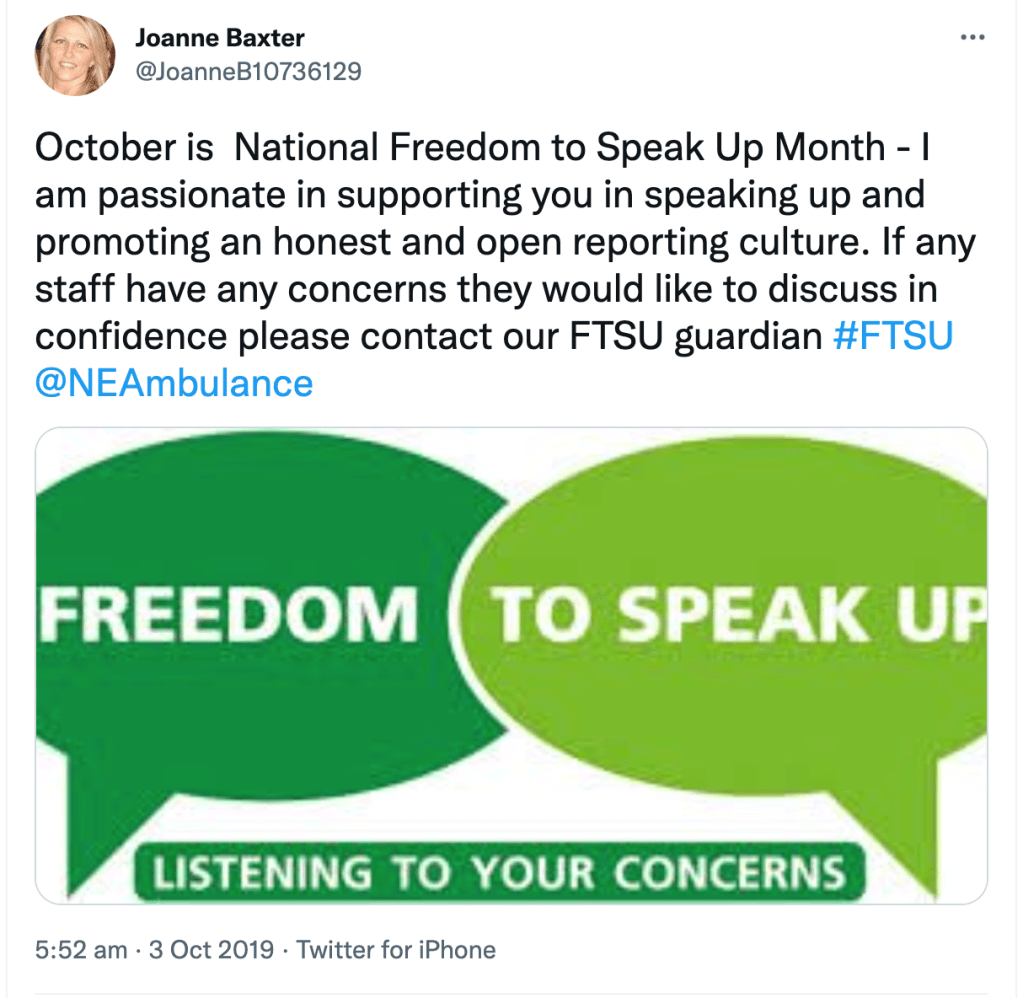By Dr Minh Alexander retired consultant psychiatrist 16 July 2022
| Summary: North East Ambulance NHS Foundation Trust like other NHS ambulance trusts is highly stressed and has been failed by the government. It is also a dysfunctional organisation. Most recently, it was alleged by the Sunday Times to have covered up care failings and related patient deaths, and to have withheld and or “doctored” evidence submitted to coroners. It was alleged that such failings continued. The trust denied this. The concerns revolved around a trust committee called the SEACARE group which operated 2019-2020, reportedly meeting weekly on at least 75 occasions. The trust’s lawyers Ward Hadaway and external counterfraud auditors AuditOne criticised the operation of this committee, respectively in 2019 and in 2020. They advised NEAS that the SEACARE group usurped the trust’s pre-existing mechanisms for coroner liaison and made unsafe decisions to withhold and or altered evidential documents disclosable to the coroner, which might amount to criminal offences. Very seriously, AuditOne concluded that NEAS failed to act on the 2019 legal advice from Ward Hadaway, raising a possible issue of wilfulness in NEAS’ conduct. AuditOne also noted that expert staff from the trust’s Coroners and Claims team were criticised when they appropriately disclosed evidence to which the coroner was entitled. The trust has not to date openly published the 2019 report by Ward Hadaway or two 2020 reports by AuditOne. I obtained one of the AuditOne reports and provide it in this post. The SEACARE group fell within the executive portfolio of NEAS’ previous Executive Nurse Joanne Baxter, who now works at Gateshead Health NHS Foundation Trust. Gateshead’s CEO Yvonne Ormston, who was CEO at NEAS between 2014 to 2019, was asked if a Fit and Proper Person (FPPR) review of Joanne Baxter was indicated by the above events. She has responded generically but not specifically. Joanne Baxter’s published details indicate that she is also an executive reviewer for the Care Quality Commission. This means that she inspects providers on the Well Led domain on CQC inspections. |
In 2019 NEAS established an unusual group, named SEACARE, which was reportedly an acronym of different teams which fed into the group.
According to a hitherto unpublished account by the private company AuditOne, the SEACARE group screened material for external release with the purported aim of checking compliance with GDPR personal data handling obligations and ensuring “accuracy”:
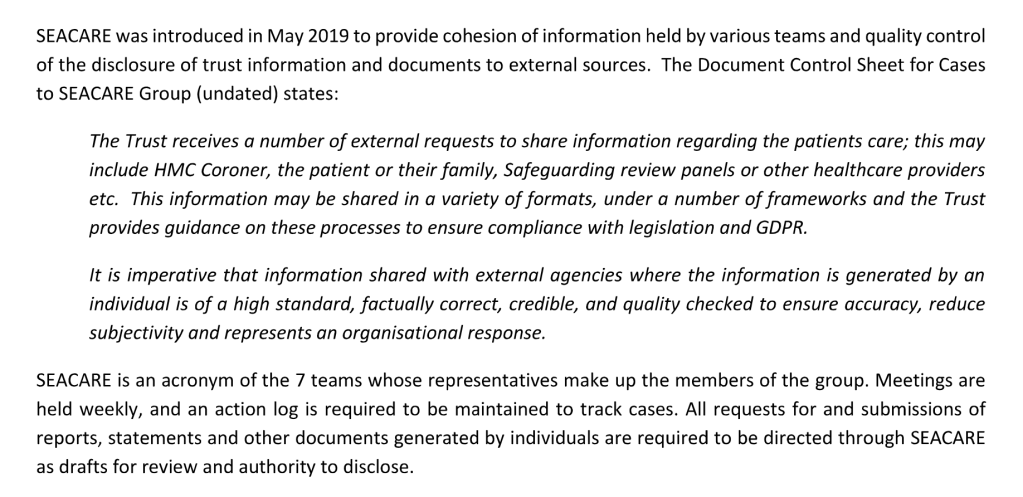
A trust quality report signed off by NEAS’ CEO in 2020 gave a slightly different account of the SEACARE group, describing it as a group which screened incidents for moderate and more serious harm, for onwards referral to other trust processes for learning from incidents:
“Each incident reported as a moderate harm is reviewed weekly at a group called SEACARE, this group includes patient Safety incidents, patient Experience concerns, Adult safeguarding concerns, Children’s safeguarding concerns, Audit from the learning from deaths process, Risk which incorporates coronial requests and concerns and External requests for information related to care provided by NEAS. Incidents determined to have a moderate harm level are further reviewed at Clinical Review Group, which enables a multi-disciplinary discussion to take place, and incidents are reviewed against the NHS England Serious Incident Framework. Incidents identified to potentially met the criteria are then discussed with the Director of Quality & Safety (Executive Nurse) or Medical Director and when confirmed, reported externally. This process ensures the correct level of review and scrutiny occurs and an opportunity for real learning and action to take place, in order to minimise the risk of harming occurring to patients.”
The contradictory private versus published accounts of the SEACARE group’s function gives concern as to motive for establishing the SEACARE group, as raised by the Sunday Times and other media.
Strangely, coronial requests for information were placed within the ambit of the SEACARE group. The two main reasons given by the trust for SEACARE’s existence, ensuring GDPR compliance and the trust’s assessment of harm, are irrelevant to the legal obligations upon the trust to comply with coroners’ requests for information. If the coroner asks for documents, the trust must disclose, whether or not it believes they are relevant and regardless of GDPR. It is for the coroner to determine relevance. Could the decision to give SEACARE influence over coronial process have been based on a consideration of reputational risk, given the CEO’s words?
“Risk which incorporates coronial requests“
But interference with evidence that is disclosable to a coroner, to manage reputation, is a potentially very serious matter, with possible criminal penalties:

The SEACARE group fell within the portfolio of the Director of Nursing Joanne Baxter, whose full title was Director of Quality and Safety and Executive Nurse.
A trust diagram from 2020 shows the SEACARE group’s place in the trust committee structure:

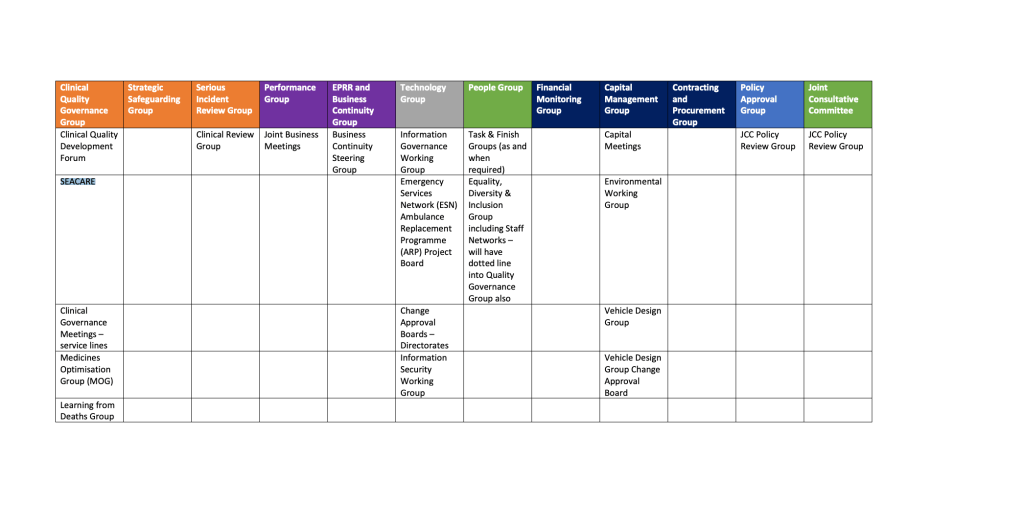
The creation of the SEACARE group and its remit to screen information released to coroners was odd and significant because NEAS already had a dedicated and qualified team which liaised with coroners: The Coroners and Claims team.
By creating SEACARE, the trust arguably placed a filtration system in place to control documents which reached the Coroners and Claims team.
AuditOne noted that inserting the SEACARE group into the coronial process caused additional delays:

On on 21 May 2022 the Sunday Times reported that particularly damning evidence was contained in a report by the private company AuditOne, which it claimed revealed that SEACARE group had withheld evidence from coroners and altered statements.
On 26 May 2022 NEAS chief executive Helen Ray issued a statement minimising the concerns and claiming that the trust had NOT withheld evidence from coroners. She cited as proof that all was now well the fact that the police and the Care Quality Commission had taken no further action.
“We fully accepted the findings of these reviews, and a task group was established to ensure full disclosure to coroners of any historical reports and a change to the process in place for dealing with future disclosures. This was led by three of our non-executive directors, supported clinically by our medical director, Dr Mathew Beattie.
The claims made that we continue to fail in respect of disclosure are incorrect. We have reaudited our process, worked with coroners and with the CQC, and have embedded regular reviews to ensure these issues cannot reoccur.
The Care Quality Commission formally responded in late 2020 to confirm they had closed the matter with no further action deemed necessary.
Northumbria Police also investigated following allegations that we had deliberately failed to disclose, conceal or destroy evidence. We worked closely with the police and their investigation was closed with no action taken. The police referred the matter back to the coroners in our region, with whom we have worked with and kept informed of our reviews and actions.”
As followers of NHS scandals will be aware, assurance by the CQC does not count for much, as the regulator has been complicit in a number of scandals and cover ups. It functions as a government flak catcher. It is particularly energetic in situations where its own regulatory failures have contributed to patient harm.
Indeed, CQC is based in the North East, and many of its functionaries are drawn from the local area. What impact does that have on the regulation of local trusts such as NEAS?
| Longstanding failures of ambulance services are a systems issue The government has failed ambulance services and the public for many years It has been plain that something is seriously awry in the way that ambulance services are organised, managed, funded and how the rest of the system impacts on ambulance services. Ambulance trusts have the highest levels of bullying. Emergency call handling has been repeatedly criticised. Shortage of paramedic staff and their working conditions are chronic problems. Broken, defunded social care, delayed hospital discharges and an inadequate number hospital beds cause wasteful and dangerous ambulance queues. A previous examination of coroners’ reports to prevent future deaths (PFD’s) showed particular problems clustering around ambulance trusts, but related to other systems problems. NEAS is no exception and has over the years attracted adverse media attention and the trust’s failures have also been debated in parliament by MPs, who have reported terrible stories of harm to constituents. |
As for the reported police decision not to pursue any action, time will tell whether NEAS committed crimes in its handling of data disclosable to coroners. Bereaved families have called for a public inquiry. One of the NEAS whistleblowers has also been calling for a public inquiry because he believes there has been a multi-agency cover up, such that only a public inquiry has the power to uncover the facts.
There is a petition: Public Inquiry Deaths Cover Up – The North East Ambulance Service.
I asked the trust for a copy of the AuditOne report cited by the Sunday Times to see what it said about the alleged tampering with evidence to coroners.
NEAS refused to give data on spurious grounds of prejudice to the conduct of public affairs, but it did admit that the SEACARE group met weekly for a total of 75 times between 18 June 2019 to 1 December 2020. I have asked for an internal review of the trust’s decision to withhold the report and other data.
I subsequently learnt that the trust had already previously disclosed an AuditOne report under FOIA. A good Samaritan sent me a copy.
This is the report:
Workforce Investigation Final Report by AuditOne June 2020
This final report gives mostly summary conclusions. It notes that an earlier, interim report was submitted by AuditOne to the trust in March 2020, presumably with more detail about cases and related trust governance failures. I surmise that this earlier and still unpublished interim report was the report cited by the Sunday Times, which discusses cases in some detail.
The final June 2020 AuditOne report also refers to a 2019 review by trust lawyers, Ward Hadaway. Ward Hadaway was reportedly critical and flagged up serious issues with the SEACARE group’s interference with the coronial process:
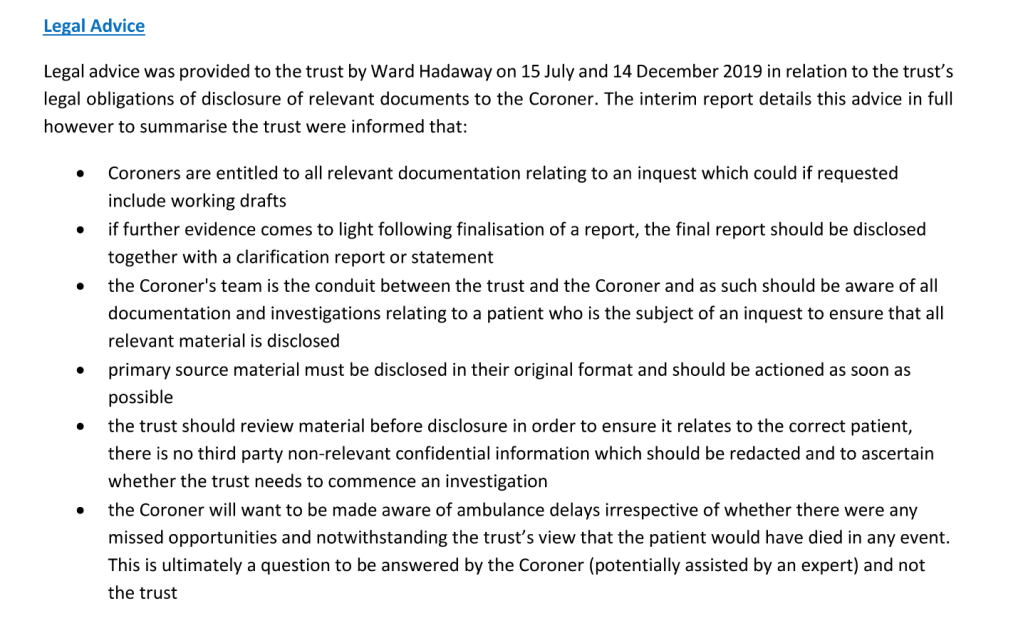
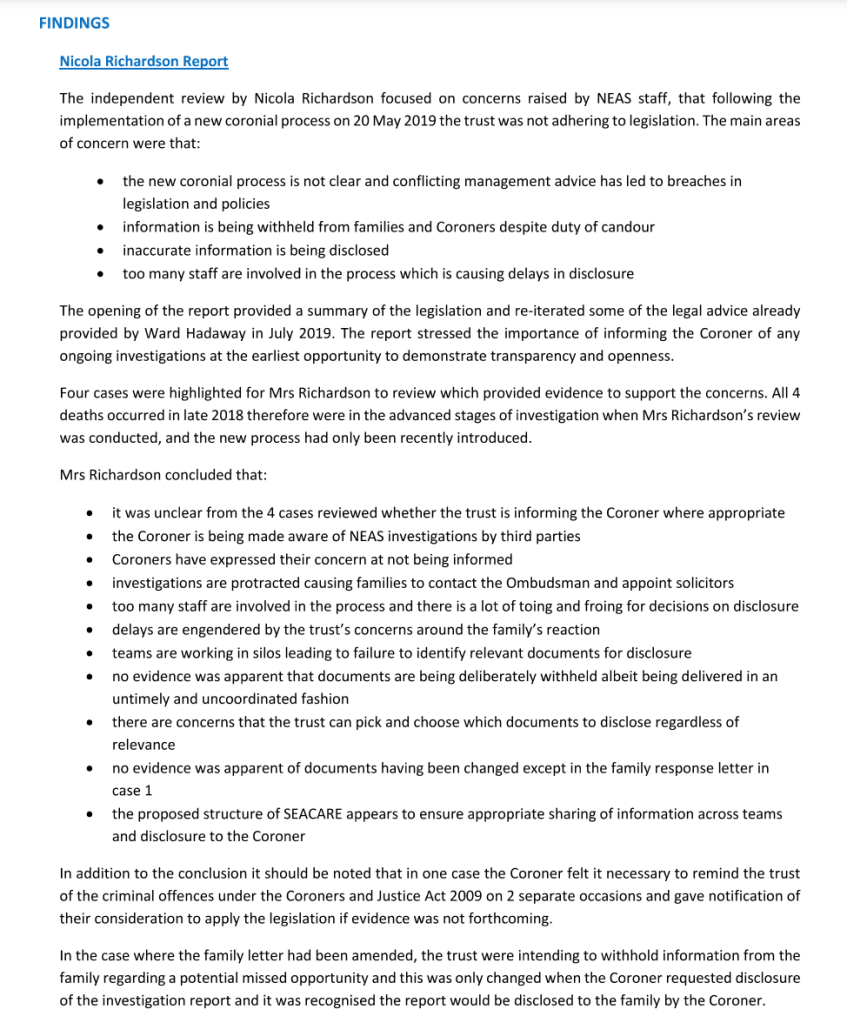
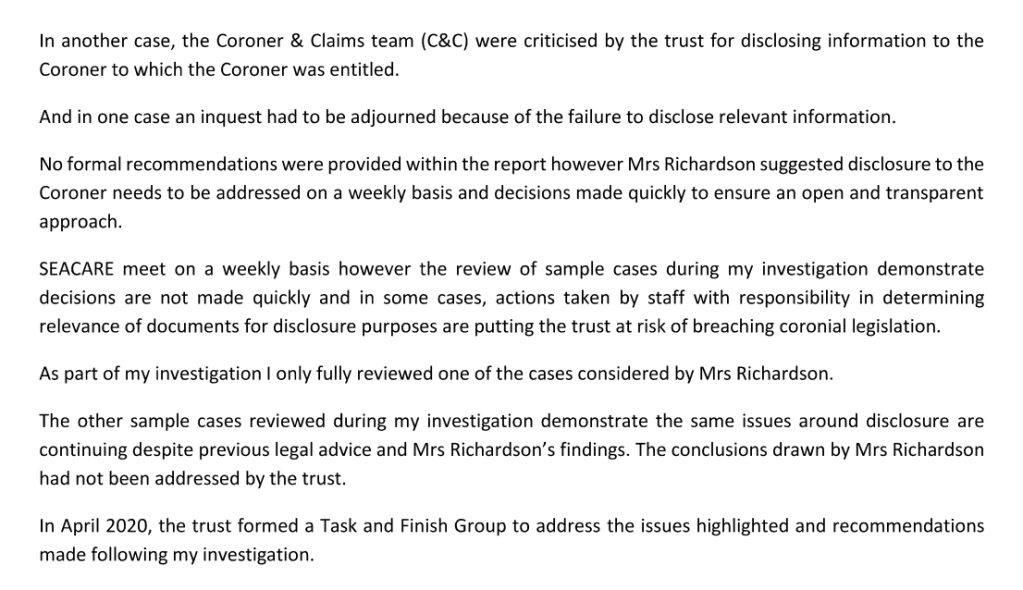
This revelation about the legal advice to NEAS in 2019 is especially serious in terms of the timeline. It implies that NEAS continued the flawed operation of the SEACARE group despite this very clear warning in 2019.
This report of Ward Hadaway’s advice also suggests that NEAS vilified staff in its Coroners and Claims team for simply doing their job, for complying with legislation and acting in the public interest.
The question that therefore arises is whether the trust intended that evidence sent to coroners should be controlled by the SEACARE group.
This links back to the fact that an element of intent defines the above criminal offences of obstructing a coroner by destroying, concealing or interfering with disclosable evidence.
The final AuditOne report of June 2020 report gives very little insight into their methodology. There is no firm indication that an in-depth investigation was conducted. It is possible of course that methodology was set out in the interim report.
The final AuditOne final report is also light on substantiating detail and facts. Again, some of the detail may have been contained in AuditOne’s interim report.
Some of the final AuditOne report’s findings are implied, but nevertheless still very serious.
For example, it is implied that the trust substituted edited corporate responses for individual statements:


The final AuditOne report also concluded that the SEACARE group possibly unlawfully withheld documents from coroners:


AuditOne concluded that the trust was at “real risk of committing criminal offences” and that the SEACARE group’s role in coronial process was “not fit for purpose”:


AuditOne recommended that control of the coronial process within the trust should be rightly returned to the Coroners and Claims team.
The whistleblowers were vindicated.
The SEACARE group was, according to the trust, dismantled after December 2020.
But the trust still reportedly tried to gag the whistleblowers, using unlawful clauses such as those requiring them to destroy evidence supporting their public interest disclosures:
North East Ambulance whistleblower ‘bullied’ over cover-up claims
Responding to this media coverage, NEAS’ current CEO Helen Ray reportedly made these comments:
“Claims made that we continue to fail in respect of disclosure are incorrect.
“We have reaudited our process, worked with coroners and with the CQC.
“We are confident that the system in place now is robust.”
NEAS’ claims that there is nothing to see and that all necessary learning and action has been taken hardly sits well with the trust’s continuing secrecy and failure to openly share both of the 2020 AuditOne reports and the 2019 Ward Hadaway report on its website.
The AuditOne investigator was a former Detective Sergeant with Northumbrian police and the AuditOne reviewer was an NHS counterfraud insider.
Their final report of June 2020 was submitted to the NHS Chair, Carolyn Peacock NED and Jennifer Boyle Trust Secretary.
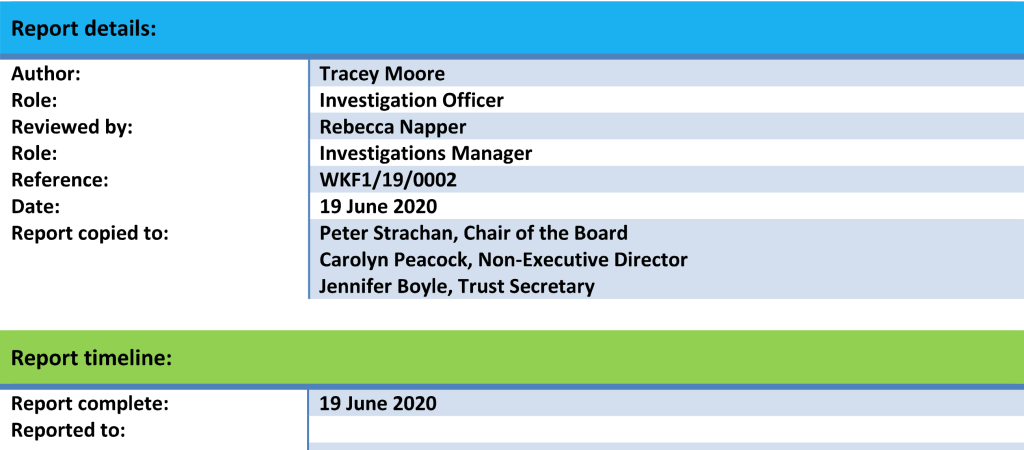
Jennifer Boyle was also the trust Freedom To Speak Up Guardian, with NEAS receiving tiny numbers of staff disclosures.
Carolyn Peacock was the Non Executive Lead for Freedom To Speak Up.
The NEAS Executive Director for Freedom To Speak Up was Joanne Baxter NEAS Director of Quality and Safety and Executive Nurse 2013-June 2020, who therefore also held the director portfolio for the SEACARE group.
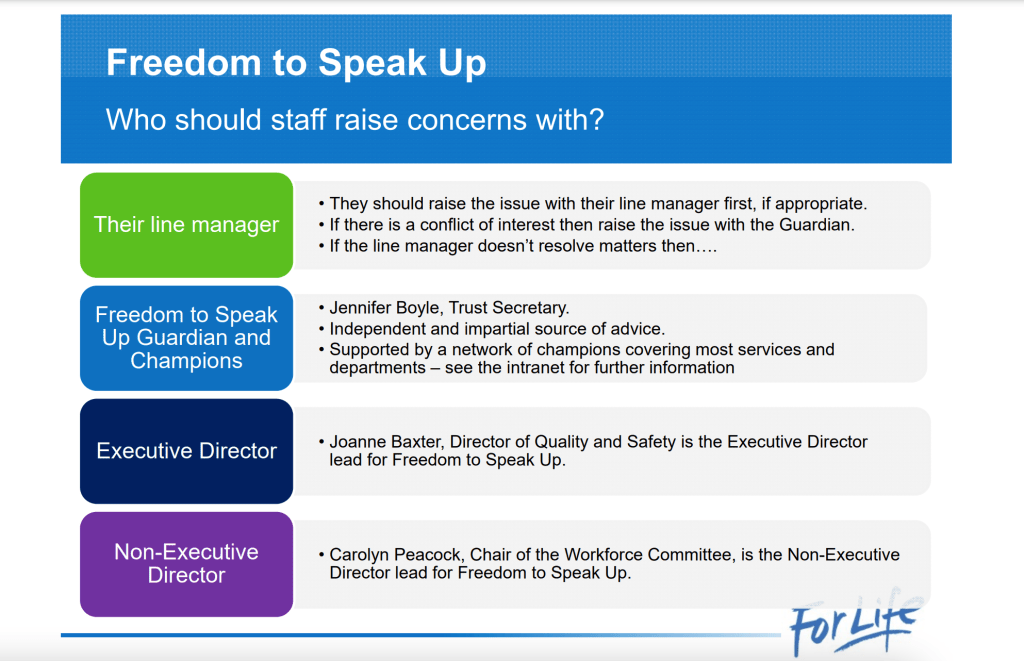
Baxter moved to Gateshead Health NHS Foundation Trust, where she is now working as Chief Operating Officer under Yvonne Ormston Gateshead CEO and former CEO of NEAS 2014 to 2019.
I asked Ormston if Gateshead had considered a review of Baxter’s fitness under CQC Regulation 5 Fit and Proper Persons, in view of the scandal about the SEACARE group and the Health Secretary’s announcement of an independent review. This was her reply of 8 July 2022:
“Dear Dr Alexander
We conduct annual fit and proper person tests for all of our Board Members in line with CQC requirements and our policy. We also require all Board Members to complete a self-declaration, which forms part of the fit and proper person annual checks. Should information be declared or become known to us during the year that may impact upon individual compliance with fit and proper persons requirements, we undertake fit and proper person testing more frequently.
Best wishes
Yvonne Ormston“
What’s more, Baxter is an executive reviewer for the CQC, which means that she inspects other providers on the Well Led domain on CQC inspections.

PETITION
Please click and add your signature to this petition to reform UK whistleblowing law – whistleblowers protect us all but weak UK law leaves them wholly exposed and it is a threat to public safety
Replace weak UK whistleblowing law and protect whistleblowers and the public
Related Items
Paul Calvert one of the above NEAS whistleblowers gave an interview to the Northern Echo revealing disclosures to NHSE England/Improvement in 2021. In his disclosure correspondence he reported that NEAS’ internal whistleblowing arrangements – the Freedom To Speak Up structure – was used to delay and prevent transparency:
I have asked NHSE/I if it has looked into this extremely serious concern. The regulator has indicated that it will get back to me on this issue.
There was a conflict of interest in NEAS’ freedom to speak up arrangements in that the Freedom To Speak Up Guardian held a corporate role and reported directly to the Executive Nurse on a number of matters.
Staff suicides at West Midlands Ambulance Service NHS Foundation Trust
The National Guardian’s Office does not put a blue light on for ambulance staff
Mr Tristan Reuser’s whistleblowing case: Scandalous employer and regulatory behaviour on FPPR
